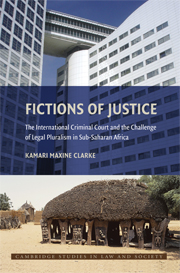 Fictions of Justice
Fictions of Justice Published online by Cambridge University Press: 23 January 2010
Understanding the tribunalization of African violence and the rise and expansion of the rule of law campaign in sub-Saharan Africa involves asking how various factors have led to conditions such that it is Africa and not Europe, the Sudan and Uganda and not the United States, for example, that are subjects of the ICC. Asking why Africa and in what context, rather than simply asserting the need for the implementation of human rights norms, allows us to focus on the ways that human rights principles travel, how they are transmitted, propelled, anchored, and in the end, how they bury the normative political apparatus that constitutes them as distinct.
Significantly, although the idea for the International Criminal Court (ICC) was presented not long after World War II, any such plans were deferred because of the Cold War. At the close of the Cold War, a growing arms trade began to fuel African conflict zones in which rebel groups were vying for regional power. The literature on civil wars in the region (Rwanda, the Democratic Republic of Congo [DRC], Ethiopia and Eritrea, Sierra Leone, Liberia, and Nigeria; e.g., Collier and Hoeffler 1998; Abdullah 2000; Hirsch 2001; Ross 2004) establishes histories of violence and struggle in which it is often the regulatory forms of resource control that are ultimately at issue. The problem: throughout the 1990s, in regions such as Rwanda, Sierra Leone, the Ivory Coast, the DRC, and Uganda, many resource-related conflicts and their resolutions, despite obvious connections to global trade circuits, found little international support – especially compared with the significant international brokering at the end of the Cold War and the formative international justice interventions at the end of World War II.
To save this book to your Kindle, first ensure [email protected] is added to your Approved Personal Document E-mail List under your Personal Document Settings on the Manage Your Content and Devices page of your Amazon account. Then enter the ‘name’ part of your Kindle email address below. Find out more about saving to your Kindle.
Note you can select to save to either the @free.kindle.com or @kindle.com variations. ‘@free.kindle.com’ emails are free but can only be saved to your device when it is connected to wi-fi. ‘@kindle.com’ emails can be delivered even when you are not connected to wi-fi, but note that service fees apply.
Find out more about the Kindle Personal Document Service.
To save content items to your account, please confirm that you agree to abide by our usage policies. If this is the first time you use this feature, you will be asked to authorise Cambridge Core to connect with your account. Find out more about saving content to Dropbox.
To save content items to your account, please confirm that you agree to abide by our usage policies. If this is the first time you use this feature, you will be asked to authorise Cambridge Core to connect with your account. Find out more about saving content to Google Drive.